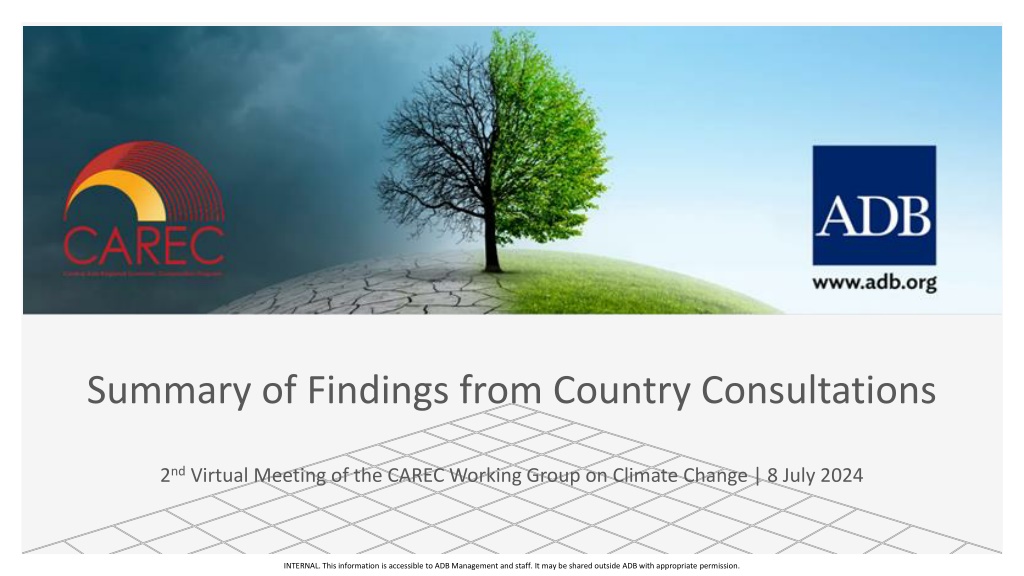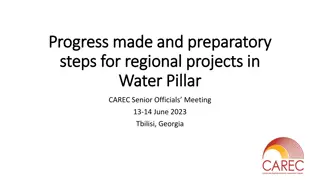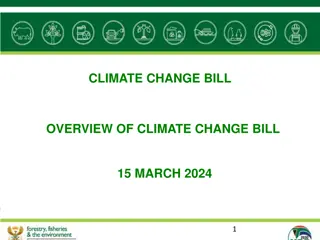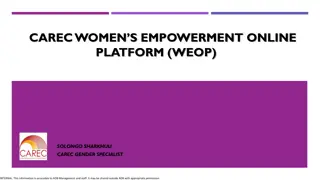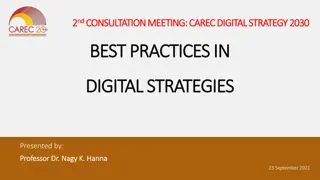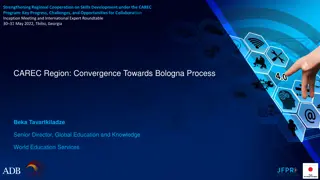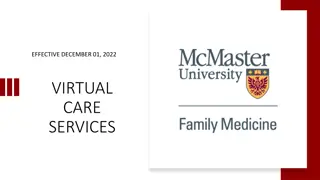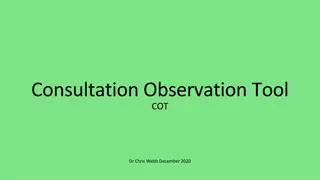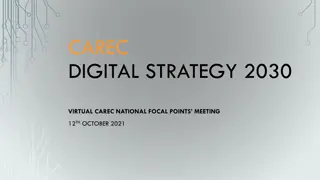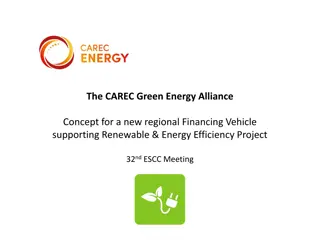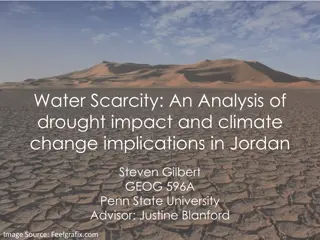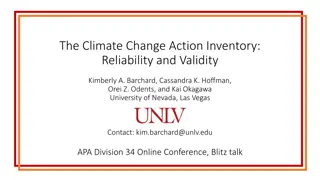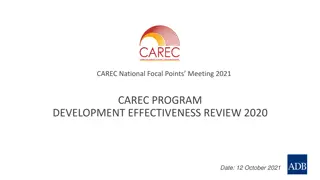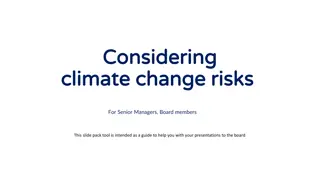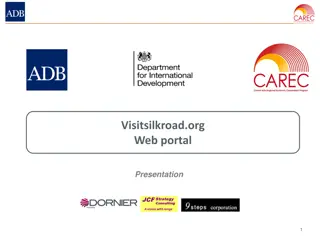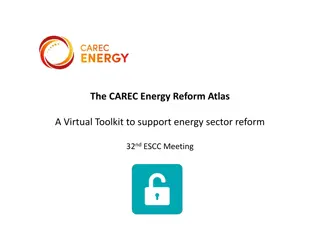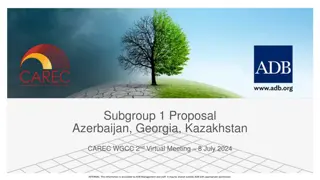Summary of Findings from Country Consultations - 2nd Virtual Meeting of the CAREC Working Group on Climate Change
Key findings from the 2nd virtual meeting of the CAREC Working Group on Climate Change include discussions on the CAREC Climate Change Action Plan, sub-group proposals on regional initiatives, new project proposals, and the agenda for the upcoming in-person meeting in Baku. The meeting focused on developing the Action Plan through feedback consolidation, ranking of priority outputs and activities, and preparations for COP29. Water emerged as a common concern, highlighting the need for climate smart agriculture practices, restoration of degraded land, and enhancing risk data and preparedness through regional early warning systems and climate risk assessments.
Download Presentation

Please find below an Image/Link to download the presentation.
The content on the website is provided AS IS for your information and personal use only. It may not be sold, licensed, or shared on other websites without obtaining consent from the author. Download presentation by click this link. If you encounter any issues during the download, it is possible that the publisher has removed the file from their server.
E N D
Presentation Transcript
Summary of Findings from Country Consultations 2ndVirtual Meeting of the CAREC Working Group on Climate Change | 8 July 2024 INTERNAL. This information is accessible to ADB Management and staff. It may be shared outside ADB with appropriate permission.
Introduction and Objectives 1. CAREC Climate Change Action Plan: consolidated inputs from questionnaire and findings from consultations 2. Sub-groups Proposals on Regional Initiatives 3. New Project Proposals (for consideration in the Action Plan) 4. Next steps and Agenda of the 2nd in-person WGCC meeting in Baku in September INTERNAL. This information is accessible to ADB Management and staff. It may be shared outside ADB with appropriate permission.
1. CAREC Climate Change Action Plan (CCAP) Virtual Clustered Consultations 2nd Virtual Meeting WGCC Early Draft Action Plan AP development Focused discussions in subgroups: 1-5 July All members: 8 July Feedback consolidation Inputs and feedback from last WGCC meeting AP areas ranking AP pillars and matrix AZE, GEO, KAZ Priority outputs and activities PRC, MON, PAK Preparations for COP29 Questionnaire / matrix distributed to WG members to formulate AP In-person 2nd WGCC meeting in Baku (Sept) KGZ, TJK, TKM, UZB - Development Partners Geographic focus and countries INTERNAL. This information is accessible to ADB Management and staff. It may be shared outside ADB with appropriate permission.
1. CAREC CCAP: Questionnaire Responses AP Area Ranking Ranking of AP priorities Climate risk assessments 1 0 5 10 15 20 25 30 35 40 Grid readiness and renewable energy integration Decarbonization 2 Climate risk assessments Water 3 Grid readiness and renewable energy CAREC climate platform, capacity support, COP Health and climate change 4 Disaster risk management and finance Decarbonization 5 CAREC climate platform, capacity Water 6 Health and climate change Disaster risk management and finance 7 TJK GEO1 UZB PRC PAK KGZ TKM INTERNAL. This information is accessible to ADB Management and staff. It may be shared outside ADB with appropriate permission.
1. CAREC CCAP: Key Findings from Consultations Water is a common concern and priority given its linkages with other critical sectors (agriculture, energy). Possible areas for CCAP: impact of glacier melting on water flow projections, climate smart agriculture practices, restoration of degraded land. Need to enhance risk data and preparedness: a. Regional multi-hazard early warning system (including heat waves) b. Climate risk assessments on regional transport and water infrastructure c. Disaster risk management and financing Development of renewable energy resources (wind, solar) and integration into the grid Focus on climate adaptation, particularly related to mountainous areas Importance of establishing linkages between regional CAREC projects and other ongoing initiatives (G2F, development partners programs, etc.) INTERNAL. This information is accessible to ADB Management and staff. It may be shared outside ADB with appropriate permission.
1. CAREC CCAP: Key Findings from Consultations Priority Area Development Partners Energy-Water Nexus WB, GCF, AIIB, ADBI (hydrogen-water nexus) Water Agriculture Nexus WB (CSA and land degradation), GCF, EBRD (agri- business), UNDP (land degradation), ADB, ADBI (agriculture and food security) Risk Assessment and Preparedness WB (risk assessments; hydromet, and DRF), GCF, UNDP (EWS and DRF), ADB (risk assessments and DRF) Health and Climate Change GCF, UNDP Low Carbon Growth WB, GCF, EBRD, AIIB, CI, ADBI Capacity Development and Climate Negotiations WB, GCF, UNDP, eCAREC, ADBI (events at COP29) INTERNAL. This information is accessible to ADB Management and staff. It may be shared outside ADB with appropriate permission.
1. CAREC CCAP: Key Findings from Consultations on COP29 All countries have initiated preparations. Some countries will have or are considering their own pavilion (PAK, UZB) or shared pavilion (KGZ shared with mountainous regions). Interest in joint CAREC sessions and side-events. Capacity building support on climate negotiations and Article 6 (on technical aspects, subsections 6.2 and 6.4). INTERNAL. This information is accessible to ADB Management and staff. It may be shared outside ADB with appropriate permission.
1. CAREC CCAP: Proposed Key Areas Low-carbon growth Climate Risk, 01 03 Preparedness, and Health Climate risk assessment and Decarbonization of transport corridors and trade, grid readiness and renewable energy integration infrastructure, regional early warning platform and heatwave preparedness, disaster risk management and financing, air pollution Focus on Adaptation NDCs NAPs alignment Water-Energy-Food Security Nexus Glacier melting impact assessment Water forecasting Climate smart agriculture CAREC Climate Platform 04 02 Regional information sharing, climate finance, capacity development, and COP INTERNAL. This information is accessible to ADB Management and staff. It may be shared outside ADB with appropriate permission.
2. Sub-Group Proposals on Regional Initiatives 1. CAREC Regional Early Warning Platform Georgia complemented by Azerbaijan and Kazakhstan 2. Climate Smart Agriculture Pakistan complemented by the People s Republic of China, and Mongolia 3. Glaciers and Water Resources Tajikistan complemented by the Kyrgyz Republic and Turkmenistan 4. Climate Risk Assessment Tool Uzbekistan Joint, regional (more than one country), with shared benefits INTERNAL. This information is accessible to ADB Management and staff. It may be shared outside ADB with appropriate permission.
3. New Project Proposals I. Green Special Economic Zones Regional Proposal Presenter: Mr. Elmar Mammadov, Co-Lead COP29 Action Agenda, COP29 Presidency II. Glaciers to Farms Regional Program Presenter: Kathleen Anne Coballes, Climate Change Specialist, ADB III. Benefits of Regional Soil Baselines Presenter: Mr. Stuart Bowlin, Managing Partner, R Tek Constructive Solutions, Kazakhstan INTERNAL. This information is accessible to ADB Management and staff. It may be shared outside ADB with appropriate permission.
4. Indicative Agenda of 2nd in-person WGCC meeting in Baku Timing Session Focus Presentation of the Draft Climate Change Action Plan and Discussion First Day Morning First Day Afternoon Breakout Discussions on Action Plan Categories for Prioritization and Conceptualization of Early- and Mid-Term Categories Second Day Morning 1. A Regional Approach to Multi-Hazard Early Warning Systems 2. Climate Adaptation in Mountainous Regions (Panel Discussion) 3. COP29 Preparations Second Day Afternoon Executive Training Workshop on Article 6 (tbc) INTERNAL. This information is accessible to ADB Management and staff. It may be shared outside ADB with appropriate permission.
Thank you for your attention INTERNAL. This information is accessible to ADB Management and staff. It may be shared outside ADB with appropriate permission.
